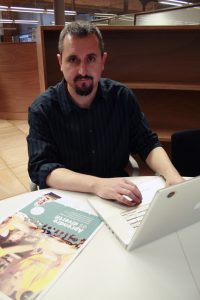Martin Dougiamas : The Man Behind the Open-source LMS Moodle
Martin Dougiamas is the Australia based educator and computer scientist, who founded one of the world’s biggest learning management system. Dougiamas has always been a keen learner, and despite lack of facilities, he was able to fulfil his desire for learning. A voracious reader and a lover of speculative fiction, he is a believer of sharing knowledge. Brent Simpson described him as “one of the rare instances in Open Source software development, where the right person with the right personality appears at exactly the right time; Martin Dougiamas is the Linus Torvalds of the LMS world and his software is the Linux of this software.”
Early Life
Dougiamas was born on 20 August 1969, in Perth, Australia. He spent most of his childhood in a deserted area in Western Australia, where, there was no facility for even basic education. He received his primary education at his home and studied from the material dropped from the aeroplane. He then joined the Kalgoorlie School of the Air, under distance education. As it was a distance learning school, he visited the school only a few times; sometimes for the school projects and a few times for the exams. He always missed being in a classroom with his classmates. At the age of ten, he became interested in wireless and internet technologies and studied books based on them.

After a few years, his family moved back to Perth, where Dougiamas joined West Balcatta Primary School and Balcatta Senior High School. He received a master’s degree and PhD from the Curtin University, Australia.
Career
At the age of 17, Dougiamas started working at Curtin University, where he taught the staff about the usage of various web applications. The internet and computers were the latest technologies that were emerging at that time, and he realized that it is not an easy task to teach people about those technologies and utilize them for teaching and learning.
The university installed the newly built learning management WebCT, one of the first learning management systems of that time, at its campus. Dougiamas was asked to improve its functionalities. But, his experience with the software was not a pleasant one, due to the restriction and software’s intellectual property rights.
Founding Moodle
Soon, Dougiamas joined the university as a student and started working on the development of a set of online tools for distance education, as the part of his PhD thesis, “The use of Open Source software to support a social constructionist epistemology of teaching and learning within Internet-based communities of reflective inquiry”. The tools he was developing for online education were soon adopted at a bigger level, and he had to eliminate them from his PhD thesis.
The first site developed on Moodle was of Peter Taylor from Curtin University, in 2001. By the end of the year, Moodle was available for downloads on CVS. In 2003, Moodle became a community-based software, with its first contributed module released on Moodle.org, a community arm for Moodle.com. People, across the world, were translating it in different languages and were developing themes for it.
In 2015, Moodle became the most used learning management system in the world, with 70,136 registered sites, in 222 territories worldwide, and in 2017, it had over 100 million registered users. Moodle Pty Ltd. HQ has over 45 employees, and it has its branches located in Australia, Spain, Canada, and the UK. The company is financed by a partners network that consists of over 80 certified companies around the world.
Personal Life
Currently, Dougiamas serves as the CEO of Moodle, Pty Ltd. He is the winner of Google-O’Reilly Open Source Award in the Education Enabler category (2008) and was awarded an honorary doctorate at the University of Vic – the Central University of Catalonia “for his contribution to open-source software through his leadership of the Moodle platform”, in 2016. He also received another honorary doctorate at the Université Catholique de Louvain, in 2018.

Yashica is a Software Engineer turned Content Writer, who loves to write on social causes and expertise in writing technical stuff. She loves to watch movies and explore new places. She believes that you need to live once before you die. So experimenting with her life and career choices, she is trying to live her life to the fullest.